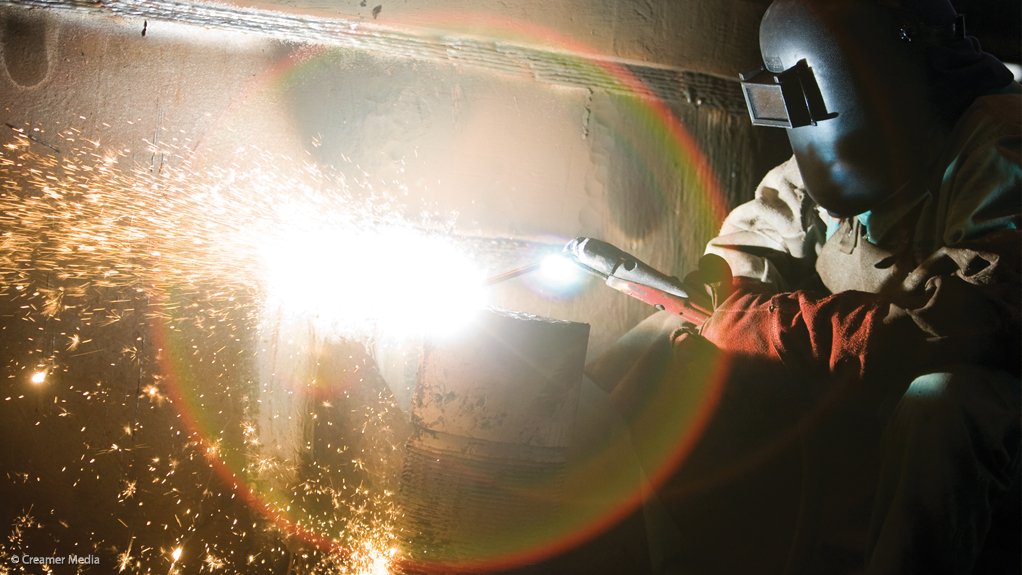Black industrialists funding forum sifting through first 50 applications
South Africa’s black industrialists funding forum had its inaugural meeting in mid-March to consider 50 applications from aspirant black-owned manufacturing enterprises, Trade and Industry Minister Dr Rob Davies revealed this week.
Speaking following a meeting with the Black Business Council (BBC), in Sandton, Davies reported that applications had been received from a diverse range of value-adding industries, with agroprocessing ventures representing the largest single category.
The other proposals had arisen from sectors as diverse as chemicals and mineral beneficiation, through to oil and gas, automotive, rail engineering, textiles and clothing, furniture, green energy, information communication technology and capital equipment.
Engineering News Online understands that as many as ten proposals were likely to be selected for approval following the first-round evaluation.
The programme would combine grant funding from the Department of Trade and Industry (DTI) with development finance from State-owned financiers such as the Industrial Development Corporation (IDC) and the Land Bank. The DTI had budgeted R1.5-billion for the initiative, while the IDC had indicated that R23-billion would be directed towards the initiative over the coming five years.
Davies stressed that the funding forum, which is chaired by the DTI’s Malebo Mabitje-Thompson, included no politicians and had been mandated to support only those manufacturing entities that had “hands on” black ownership and/or control.
The various development finance institutions (DFIs) involved in the programme would follow their normal internal approval processes, with the forum acting as a “one-stop shop” to combine the various incentives from government, with DFI loan and equity funding and even market opportunities arising from within some of the large State-owned companies, such as Eskom and Transnet.
Government had insisted on “tight” qualifying criteria, with Davies indicating that beneficiary firms would need to be either predominantly black owned or controlled. The entrepreneurs would also need to have “skin in the game” by taking personal risk, while the businesses themselves would need to operate in sectors identified for support in the Industrial Policy Action Plan.
“So who’s not eligible? That’s somebody who is just making an investment in a white-owned company, or is only peripherally involved in procuring products from manufacturers, but not actually manufacturing themselves.”
The DTI had agreed to further discussions with the BBC to assess whether the programme could be extended to the construction sector, but Davies said it would not be extended to areas such as retail or financial services.
“We are looking at productive-sector entrepreneurs. That’s who we are wanting to support,” Davies said, lamenting the fact that the number of black-owned manufacturing enterprises was still low and their scale too small.
The DTI was also seeking to more fully integrate empowerment criteria into it other incentive programmes, including its flagship Manufacturing Competitiveness Enhancement Programme (MCEP), funding for which would be replenished on April 1 – DTI had to scale back on approvals in 2015/16, owing to insufficient funding.
Director-general Lionel October indicated that criteria under MCEP had been changed to stipulate that beneficiaries needed to have a ‘level four’ broad-based black economic-empowerment rating, while empowerment requirements were also being introduced in to its various other incentive schemes, including those available in the automotive sector.
The DTI was also conducting a review of MCEP, which was likely to result in the emergence of more sector-specific incentives in future.
BBC president Ndaba Ntsele praised the approach being taken by government to support the creation of black industrialists, describing it as a positive departure from the previous empowerment model, which had focused primarily on debt-funded share transactions.
“The difference here is that we want people who are going to be hands on. So nobody is going to be having a small share in some big company simply to become an empowerment partner,” Ntsele added.
Article Enquiry
Email Article
Save Article
Feedback
To advertise email advertising@creamermedia.co.za or click here
Press Office
Announcements
What's On
Subscribe to improve your user experience...
Option 1 (equivalent of R125 a month):
Receive a weekly copy of Creamer Media's Engineering News & Mining Weekly magazine
(print copy for those in South Africa and e-magazine for those outside of South Africa)
Receive daily email newsletters
Access to full search results
Access archive of magazine back copies
Access to Projects in Progress
Access to ONE Research Report of your choice in PDF format
Option 2 (equivalent of R375 a month):
All benefits from Option 1
PLUS
Access to Creamer Media's Research Channel Africa for ALL Research Reports, in PDF format, on various industrial and mining sectors
including Electricity; Water; Energy Transition; Hydrogen; Roads, Rail and Ports; Coal; Gold; Platinum; Battery Metals; etc.
Already a subscriber?
Forgotten your password?
Receive weekly copy of Creamer Media's Engineering News & Mining Weekly magazine (print copy for those in South Africa and e-magazine for those outside of South Africa)
➕
Recieve daily email newsletters
➕
Access to full search results
➕
Access archive of magazine back copies
➕
Access to Projects in Progress
➕
Access to ONE Research Report of your choice in PDF format
RESEARCH CHANNEL AFRICA
R4500 (equivalent of R375 a month)
SUBSCRIBEAll benefits from Option 1
➕
Access to Creamer Media's Research Channel Africa for ALL Research Reports on various industrial and mining sectors, in PDF format, including on:
Electricity
➕
Water
➕
Energy Transition
➕
Hydrogen
➕
Roads, Rail and Ports
➕
Coal
➕
Gold
➕
Platinum
➕
Battery Metals
➕
etc.
Receive all benefits from Option 1 or Option 2 delivered to numerous people at your company
➕
Multiple User names and Passwords for simultaneous log-ins
➕
Intranet integration access to all in your organisation


















